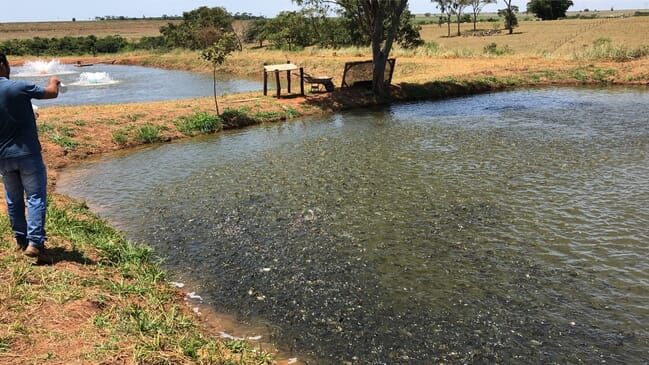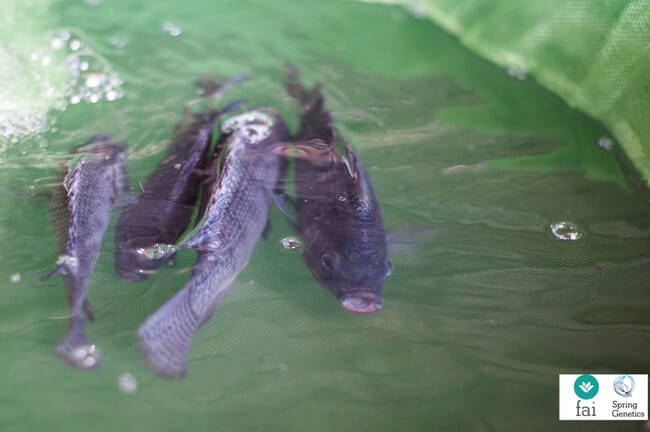
© FAI Farms
FAI Farms, in partnership with the Animal Welfare Laboratory at Paraná State University (LABEA), are using high level applied sciences, developed and tested on some of the main production sites regions in Brazil. The first on-farm welfare assessment protocol for tilapia is now being prepared to enter full scale application in a high profile production environment by two of the greatest Brazilian tilapia stakeholders, partners on the Tilapia Welfare Project - Global Peixes, led by its general manager Emerson José Esteves, and GeneSeas, supported by Melissa S Selingardi, quality assurance coordinator. The initiative is now set to be backed up by an online course too.
“These are some of the first tilapia welfare assessment protocols, which can be adapted to any aquaculture production system. Alongside FAI’s long experience from terrestrial agriculture (which allowed us to jump a lot of steps), this newly developed tool proved to be very applicable on-farm and produce robust scientific data and practical results,” explains Dr Ana Silvia Pedrazzani, a post-doctoral researcher at LABEA.
“We’re now developing an online learning model to introduce the concept to the supply chain – including why welfare standards need to improve; practical and commercial aspects of welfare critical points; and public perception about fish sentience and production system. We’re now putting together the course in English, Portuguese, Spanish and Chinese,” adds Murilo Quintiliano, FAI’s director for Latin America and developing countries.
The measures and course are also being backed up by an app, which will allow tilapia farmers to measure welfare degrees on-farm and share information with their colleagues, in an attempt to improve tilapia welfare across the sector – first in Brazil then in South East Asia.
“The app will allow farmers in the tilapia sector to share information regarding fish health, and environmental factors – similar to our shrimp app in Thailand. We’re initially launching this in Brazil but we aim to target the Asian market in the long term,” Quintiliano explains.

© FAI/Spring Genetics
Successful field trials
Recent field trials of the app have, according to Quintiliano, been successful.
“We’ve partnered with one of Brazil’s biggest producers, GeneSeas, and one of the country’s largest fingerling producers, Global Peixes. And we’re confident that the app will get a good reception for raising awareness of animal welfare in fish production,” Quintiliano reflects.
Fish welfare has been raised substantially in some aquaculture sectors, but it’s relatively new to the tilapia sector, which has – traditionally – focused purely on keeping the fish alive until they reach harvest size.
“Semi-intensive tilapia production is very basic compared to species such as salmon, but we feel that this concept can help to change the attitude of farmers – there is more to aquaculture than just keeping fish alive,” Quintiliano explains.
“This technology will result in improved fish quality and a reduction of mortalities from the producers’ perspective. It will also reduce suffering and pain – which stands to benefit the fish and make them more appealing to consumers,” he adds.
Global significance
Quintiliano feels that the time is ripe for raising the welfare bar for tilapia – not least as the sector is second only to carps in terms of global finfish production levels, and is also set to increase rapidly in the coming years: Brazil, Bangladesh and some of the countries in Sub-Saharan Africa being good examples of countries where tilapia harvests are growing the most quickly.
“Fish welfare is the new frontier, global fish consumption is rising, and NGOs and governments are increasingly promoting fish welfare. There’s also a chance for the tilapia sector to avoid the mistakes make by other areas of aquaculture and agriculture,” Quintiliano explains.
The welfare initiative was funded by OPP and, while FAI no longer operates its own tilapia farm in Brazil, Quintiliano believes the experience has proved very useful.
“We’re no longer farming tilapia ourselves – Spring Genetics took over our tilapia farm [when Benchmark, the former parent company of FAI sold off its non-core assets] – but we bring four years of production experience with us, which has given us useful experience and useful contacts in the industry.


